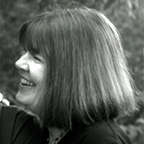



"My father, it seems, cannot stop drinking … For almost twenty years, since high
school, he has identified himself as a writer, but he has yet to write much, beyond
notes scribbled out on cocktail napkins, titles for his novels-to-be."
—Nick Flynn, Another Bullshit Night in Suck City
They're such familiar figures. Edgar Allan Poe arriving drunk at a job interview in Washington, D.C. with his cloak inside out. F. Scott Fitzgerald jumping into the Plaza Hotel fountain with Zelda, passing out on his front lawn, driving his car into a pond just for kicks. Hart Crane throwing furniture out the window, shouting that he was Christopher Marlowe. Dylan Thomas tumbling down a flight of stairs on a visit to New York and fracturing his arm, and boasting at the White Horse Tavern, "I've had eighteen straight whiskies. I think that's the record." Brendan Behan vomiting on camera during a live interview on the BBC, and banned by a judge from marching in the New York St. Patrick's Day Parade for being a "drunken disgrace." Ernest Hemingway in a fistfight with Wallace Stevens outside a cocktail party in Key West, both of them smashed. "You think you're Ernest Hemingway?" Stevens jeered, before breaking his hand in a blow to Hemingway's jaw. And then there are the suicides. Hemingway with a double-barreled shotgun in his mouth. Hunter Thompson with a .45 caliber Smith & Wesson. Hart Crane jumping off a steamship in the Gulf of Mexico. John Berryman leaping from a Minneapolis bridge. The legendary figure of the alienated, rebellious, hedonistic, self-indulgent, self-destructive writer isn't just American or British, either. There's the French poète maudit, afflicted not only by deliberate derangement of the senses, alienation, and early death, but often by insanity and criminal tendencies as well. François Villon. Charles Baudelaire. Arthur Rimbaud.
Poe, a cult hero among French writers, claimed he drank in a "desperate attempt to escape from torturing memories, from a sense of insupportable loneliness and a dread of some strange impending doom." Jack Kerouac said he drank to achieve "ecstasy of mind." In Eugene O'Neill's great drama of alcoholism and addiction, Long Day's Journey into Night, his alter ego character Edmund Tyrone quotes Baudelaire: "If you would not feel the burden of Time weighing on your shoulders and crushing you to the earth, be drunken continually." All of the men in the Tyrone family drink to blot out the past. "If something bad happens you drink in an attempt to forget," Charles Bukowski wrote in Women. "If something good happens you drink in order to celebrate; and if nothing happens you drink to make something happen.” Writers drink to buoy their spirits, calm their nerves, release themselves from inhibitions, alleviate solitude, overcome shyness, heighten feeling, deaden feeling, cope with depression, escape. They drink, many claim, because they are alienated from a world inimical to art.
Looking back after twelve years of sobriety, Stephen King called the "idea that creative endeavor and mind-altering substances are entwined … one of the great pop-intellectual myths of our time." King outlined the "world-famous Hemingway Defense" in his craft handbook and memoir On Writing. Writers are sensitive, the reasoning goes. The world is harsh. Writers who are real men don't give in. "Therefore I drink. How else can I face the existential horror of it all and continue to work?"
It may be that writers are barometers of the angst of their times. Many writers use this mythology to justify their own excesses and avoid confronting their disease. There are even "writers" who live like this without ever actually writing. But why would anyone embrace the Hemingway Defense knowing Hemingway's fate? Why aspire to be a writer with such a future in store? The self-destruction inherent in the popular myth surely outweighs the glamour and romance.
"First you take a drink," Fitzgerald observed, "then the drink takes a drink, then the drink takes you." The drink has taken many fine writers. Fitzgerald was only 44 when he died of an alcohol-related heart attack, his second. Behan, who called himself "a drinker with a writing problem," collapsed in a Dublin pub and died at the age of 41 of diabetes compounded by alcohol abuse. Kerouac died at 47 of internal hemorrhaging and cirrhosis of the liver brought on by drinking. Dylan Thomas, who jokingly introduced his wife Caitlin as his "widow," died of pneumonia, fatty liver, and alcoholic "wet brain." He was drinking heavily at the time, suffering from chronic blackouts, and had just celebrated his 39th birthday. Hemingway and Berryman and Thompson and Crane committed suicide. The list goes on.
There are no second acts, indeed, in lives like these.
I am a recovering alcoholic who got sober in 1990. Looking back I could probably locate many sources for my alcoholism, starting with my Irish DNA. "It's a good man's failing," the Irish have always said, an apologia and covert lament. Other alcoholics tucked away on both sides of our family tree include Great Uncle Tommy, who died before I was born in a suspicious Bowery hotel fire, and was probably a bum. "It was the war did it to him," family members whispered, shaking their heads. I can't claim a precipitating trauma. I'm antisocial, often shy and socially awkward, and alcohol made me comfortably outgoing. I had aspirations to leave my anti-intellectual, uncultured suburban upbringing behind, and knowing about wines made me feel sophisticated. (My parents, daily drinkers of cocktails, never ventured beyond Gallo in jugs.) I rebelled against the gender roles prescribed by my suburban New Jersey upbringing, and drinking alcohol made me feel like I was taking on the privileges of men. I remember standing outside the church at my brother's wedding in Wisconsin, swigging whiskey from a flask with the ushers. The October air was crisp and chilly, and I felt independent, invincible, superior to the giggling bridesmaids inside. At the reception a sweet boy kept buying me brandies. I drove my brother's truck home to their house that night during my first and only blackout. I could have killed someone, or myself.
And there was the potent mythology surrounding writers and alcohol. Drinking made me not only one of the boys, but one of the creative boys. It was glamorous. Writers in college and graduate school hung out in bars until the early hours of the morning, drunkenly reciting verse and recounting the outlandish antics of their predecessors. My writer boyfriend and I reeled home in high spirits after last call at Pete's Cayuga Bar, and read Bukowski's stories out loud to each other in bed. "What is your advice to young writers?" an interviewer asked Bukowski. "Drink, fuck, and smoke plenty of cigarettes." "What is your advice to older writers?" the interviewer asked. “If you're still alive, you don't need any advice," he answered. The more outrageous Bukowski's behavior in his autobiographical fiction, the more we laughed. I wasn't ready to identify with his raw, caustic self-appraisals.
But since I've gotten sober, I've noticed a few things. Not all writers are drunks. My own productivity has increased tremendously. Before I often wrote in an alcoholic euphoria after a night out of drinking, or induced a kind of euphoria sipping wine by my computer, and it sometimes produced results, but there wasn't much follow-through. While I often wake up now with ideas I want to get on the page right away, on those mornings I was hung over and not likely to write at all. I still experience periods of inspiration that seem magical, unbidden. But the first steps are simple. Close the door. Sit down at the computer with a clear head and a cup of coffee. Start with revision if nothing new presents itself. Let the words take over.
Over the years I have had talented students who seem determined to drink themselves to death, convinced that alcohol (and the drunken, funny but not-so-funny episodes that follow) is an essential component in their creativity. Some of them idolize Bukowski and Hunter Thompson, for all the wrong reasons. Some quote Papa Hemingway: "Write drunk; edit sober." It's not a myth I buy into.
Stephen King is one of many writers who managed to achieve sobriety and maintain their inspiration. "Creative people probably do run a greater risk of alcoholism and addiction than those in other jobs," he said in On Writing, "but so what? We all look pretty much the same when we're puking in the gutter." Raymond Carver experienced a year of writer's block after he quit drinking, and then went on to produce his greatest work. Carver was influenced by a prominent interview of John Cheever by his daughter Susan in Newsweek. "The turning point," Cheever told her, "was when I appeared to be dying. It made me realize that my ardor for life was quite genuine, and anything I could do to continue alive and useful I was quite willing to do." Elmore Leonard numbers sobriety among the "secrets of my success": "I've been sober since 1977 and I think I've got noticeably better because I'm not writing hung over." Nick Flynn, Anne Lamott, and Mary Karr have written eloquent accounts of saving their lives and their writing from the effects of addiction.
Today my husband and I often spend full days writing in our studies. We still like Bukowski. We live in a suburb in the San Francisco Bay Area, where we ferried our son to cross-country meets and soccer games, oversaw his homework, went to parent-teacher conferences, ushered him off to college, the usual suburban parent stuff. We both have full-time teaching jobs. Our crises are the usual ones. Our son's difficulty settling on a vocation. My aging mother's mental health. Repairs on our old house. The impact of the state budget on our jobs. When we agonize over our writing, which we do, it's not because of alcohol. In fact many writers lead uneventful lives. Some have even deliberately led uneventful lives in service of their art. Gustave Flaubert's prescription for success as a writer counters the romantic myth so many young writers still cling to. "Soyez réglé dans votre vie et ordinaire comme un bourgeois," Flaubert wrote to Gertrude Tennant in December 1876, "afin d'être violent et original dans vos œuvres." Which translates something like this: "Be regular and ordinary in your life like a bourgeois, so you can be original and violent in your work."
Jacqueline Doyle lives in the San Francisco Bay Area, where she teaches at Cal State, East Bay. She has work published and forthcoming in numerous literary journals, including South Loop Review, The Rumpus, Vestal Review, Monkeybicycle, South Dakota Review, Front Porch Journal, and Ninth Letter online.
You can visit her here: Jacqueline Doyle
ISSUE:
S U M M E R
2013
SUPPORT THE ARTS
DONATE TODAY
GET A FREE T-SHIRT!
By accessing this site, you accept these Terms and Conditions.
Copyright © 2010-2013 TheWritingDisorder.com ™ — All rights reserved